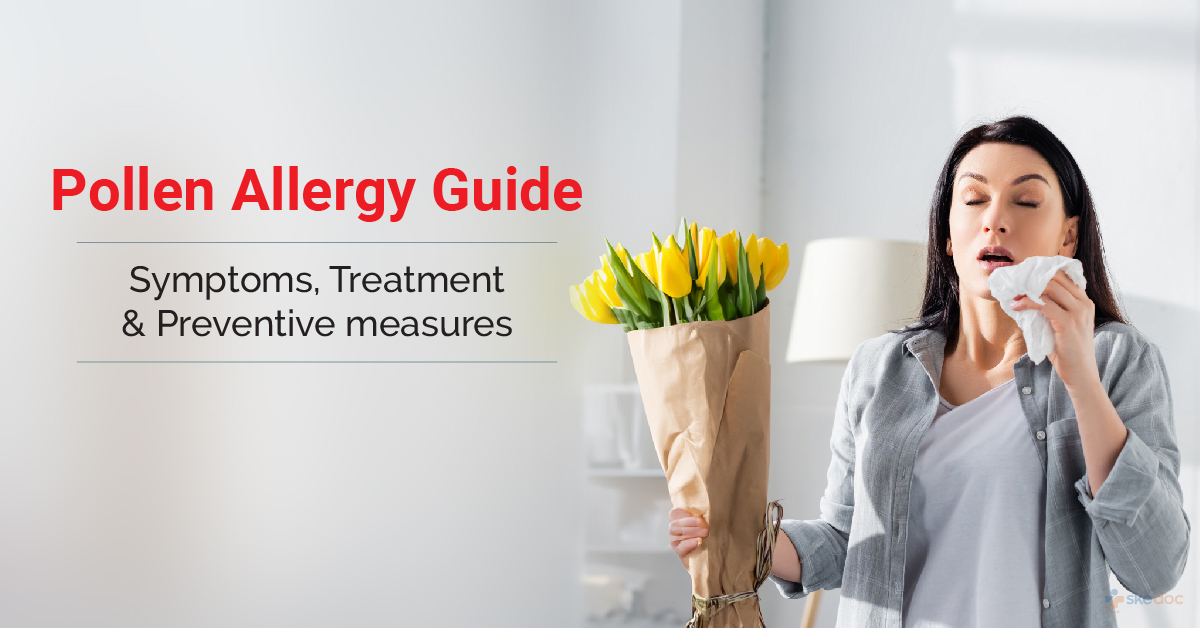Allergy
Blood Diseases
Bone & Joints
Brain
Cancer
Child Care
Cosmetic Surgery
Diabetes
Endocrinology
ENT
Eye
Gen Medicine
General Surgery
Heart
Kidney
Lifestyle
Liver & Digestive
Lung
Men’s Health
Mental health
Physiotherapy
Rheumatology
Skin and hair
Sleep Disorders
Spine
Transplant
Women Health
Thyroid
Vascular Surgery
Pollen Allergy

What Is Pollen Allergy?
Pollen Allergy is an exaggerated response of the body’s immune system to pollen and is mostly seen in certain seasons when these dry, light grains released by trees, weeds, and grasses for fertilization are found in the air, hence, it is also known as seasonal allergy. Most pollen that causes pollen allergy comes from plants that use wind as a pollination mechanism.
Alternate names
Seasonal Allergic Rhinitis / Hay Fever
Is this condition a medical emergency?
It is not a medical emergency.
Causes
It results from the body’s immune system mistakenly identifying pollen as a harmful substance and subsequently producing antibodies that target it. This leads to an exaggerated response to subsequent exposure to pollen.
Risk factors
The following are the risk factors for Pollen Allergy:
- History or presence of asthma
- History or presence of atopic dermatitis
- Air pollution
- Maternal tobacco smoking
Triggering factors
Inhalation or exposure to pollen results in the allergic response being triggered.
Symptoms & signs
The symptoms and signs of a pollen allergy may include:
- Nose: Sneezing, swelling of the nasal mucosa, runny nose, itching of the nose
- Sinuses: Swelling of the nasal mucosa, nasal discharge, headache
- Eyes: Redness, itching, watering of the eyes
- Airways: Sneezing, cough, wheezing, breathlessness, and extreme airway constriction in severe cases
- Ears: The feeling of fullness, dizziness, impaired hearing
Investigations
It can be confirmed or ruled out by performing specific investigations, which may include:
- Skin Prick Testing: They are also known as puncture or prick tests; small quantities of all the suspected allergens are introduced into skin sites marked with a dye. If an individual is allergic, there will be a visible inflammatory reaction within 30 minutes at the site of the allergen responsible.
- Blood Tests: A blood sample is tested for the presence of IgE antibodies for either a specific allergen or multiple allergens. High levels of a specific IgE antibody indicate the presence of an allergic reaction to that particular allergen. ELISA, RAST, and FEIA are tests done to check for specific IgE antibodies.
- Patch Testing: This is done to check if a specific substance causes an allergic response in the skin by using multiple adhesive patches containing small quantities of allergens.
Diagnosis
A diagnosis is established based on medical history, clinical evaluation, and results of the investigations done.
Treatment options
The treatment of this allergy aims to provide relief from the symptoms. The best treatment for pollen allergy is to protect oneself from inhaling it.
Medical management
Medical management of a pollen allergy may include:
- Medications
- Antihistamines: Act by blocking histamine receptors; they are taken orally or nasally to reduce the symptoms. Antihistamine eye drops can help to reduce eye symptoms.
- Glucocorticoids/Steroids: Act by increasing the anti-inflammatory process and decreasing the pro-inflammatory process. Inhaled corticosteroids are effective in reducing and controlling nasal symptoms.
- Antileukotriene agents: Act by blocking leukotriene receptors and prevent inflammatory reactions
- Decongestants: Used to relieve nasal decongestion
- Epinephrine: Used in the emergency treatment of anaphylaxis
- Allergen Immunotherapy: It is the process of exposing the individual to larger and larger quantities of the allergen to change the response of the immune system. It is usually used to manage environmental allergies, allergies to insect bites, and asthma. It is not recommended for food allergies.
Some measures that may provide relief from symptoms include:
- Nasal Irrigation: Done with saline solution
Role of Diet/Exercise/Lifestyle changes/Preventive measures
Some measures that can be taken to prevent a pollen allergy include:
- Being aware and limiting outdoor activity when the seasons of pollination begin or when the pollen count is high
- Keeping pollen out of the home by keeping windows closed or using air purifiers or air conditioners
- Using protection such as filters, hats, and sunglasses when going out
- Starting allergy medication just before the season begins or before the symptoms begin
- Washing hair to remove pollen that may be present
- Limiting contact with pets that spend time outside and carry pollen in their fur
Complications
Pollen Allergy, if very severe, can sometimes lead to an anaphylactic reaction.
Prognosis
The prognosis is generally very good, although it can affect productivity and quality of life to a certain extent.
When to contact the doctor or hospital/How to identify the emergency or complications?
It is advisable to seek medical attention if the symptoms and signs of an allergy are noticed, especially if there is severe breathlessness, fainting or dizziness, swelling of the face or throat, or low blood pressure.
Indications for hospitalization if required
Hospitalization is not required for pollen allergies unless a severe complication like anaphylaxis develops.
Suggested clinical specialist/Departments to consult for this condition
Specialists from the Department of Allergy & Immunology will attend it.
Was this article helpful?
YesNo




